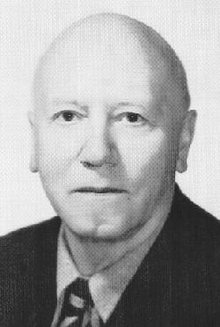Our website is made possible by displaying online advertisements to our visitors.
Please consider supporting us by disabling your ad blocker.
C. D. Broad
C. D. Broad | |
|---|---|
 Broad in 1959 | |
| Born | Charlie Dunbar Broad 30 December 1887 |
| Died | 11 March 1971 (aged 83) Cambridge, Cambridgeshire, England |
| Alma mater | Trinity College, Cambridge |
| Era | 20th-century philosophy |
| Region | Western philosophy |
| School | Analytic |
| Institutions | Trinity College, Cambridge |
| Academic advisors | J. M. E. McTaggart |
| Doctoral students | Knut Erik Tranøy[1] |
Main interests | Metaphysics, epistemology, ethics, philosophy of mind, logic |
Notable ideas | Growing block universe Rate of passage argument[2][3] The "critical philosophy" and "speculative philosophy" distinction[4] The "occurrent causation" and "non-occurrent causation" distinction |
Charlie Dunbar Broad FBA (30 December 1887 – 11 March 1971), usually cited as C. D. Broad, was an English epistemologist, historian of philosophy, philosopher of science, moral philosopher, and writer on the philosophical aspects of psychical research. He was known for his thorough and dispassionate examinations of arguments in such works as Scientific Thought (1923), The Mind and Its Place in Nature (1925), and Examination of McTaggart's Philosophy (2 vols., 1933–1938).
Broad's essay on "Determinism, Indeterminism, and Libertarianism" in Ethics and the History of Philosophy (1952) introduced the philosophical terms occurrent causation and non-occurrent causation, which became the basis for the contemporary distinction between "agent-causal" and "event-causal" in debates on libertarian free will.
- ^ Knut E. Tranøy, "Wittgenstein in Cambridge 1949–1951: Some Personal Recollections", in: F. A. Flowers III, Ian Ground (eds.), Portraits of Wittgenstein: Abridged Edition, Bloomsbury Academic, 2018, p. 452.
- ^ C. D. Broad (1978), "Ostensible temporality." In Richard M. Gale (ed.), The Philosophy of Time: A Collection of Essays, Humanities Press.
- ^ Ned Markosian, "How fast does time pass?", Philosophy and Phenomenological Research 53(4):829–844 (1993).
- ^ C. D. Broad. "Critical and Speculative Philosophy". In Contemporary British Philosophy: Personal Statements (First Series), ed. J. H. Muirhead (London: G. Allen and Unwin, 1924): 77–100.
Previous Page Next Page


